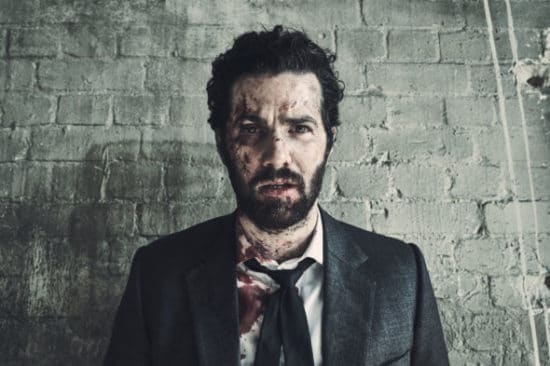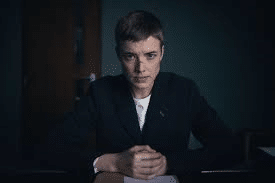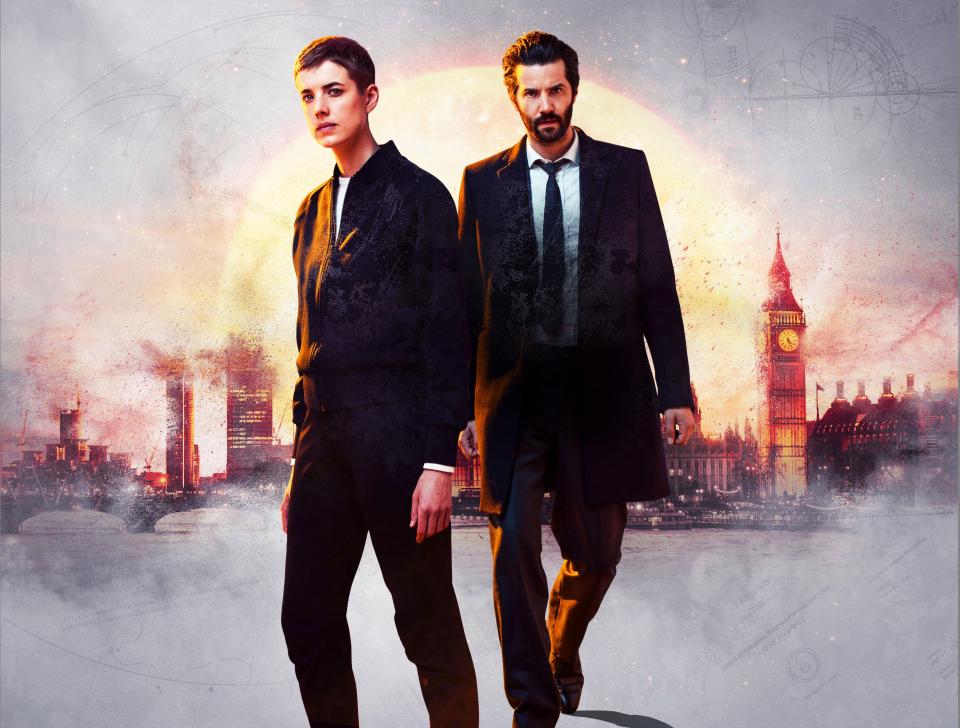 We’ve all heard of post-apocalyptic drama – literature, film and television which look at life after the End of the World as We Know It – and we can all name a few noteworthy examples, I’m sure. Well, the recent BBC series Hard Sun reinterprets this idea, giving us something rather different: ‘pre-apocalyptic drama’. It’s a new one on me. But, using this idea of a modern world poised on the edge of something catastrophic has – at least on paper – some bite. How would knowledge of some impending doom alter the behaviour of people waiting for it to come?
We’ve all heard of post-apocalyptic drama – literature, film and television which look at life after the End of the World as We Know It – and we can all name a few noteworthy examples, I’m sure. Well, the recent BBC series Hard Sun reinterprets this idea, giving us something rather different: ‘pre-apocalyptic drama’. It’s a new one on me. But, using this idea of a modern world poised on the edge of something catastrophic has – at least on paper – some bite. How would knowledge of some impending doom alter the behaviour of people waiting for it to come?
Set in modern London, Hard Sun begins its life as a standard cop drama, with DI Elaine Renko (Agyness Deyn) being drafted to a new constabulary for the shady purpose of investigating her new colleague, Charlie Hicks (Jim Sturgess), who is in the frame for murder. Of course, Hicks doesn’t know about this, so at first he can focus on being suspicious about the swap for more nebulous reasons. Renko, meanwhile, who is living out of a hotel after her estranged teenage son tried to kill her and burned her house down, is ‘happily’ getting on with her undercover role when the apparent suicide of a computer hacker throws both her and Hicks into a whole new world of trouble. It seems that there’s a conspiracy afoot to keep a piece of devastating news from the public – news which the hackers found, and unwittingly brought into the public domain via a certain flash drive, which the powers-that-be are desperate to get back.
The flash drive contains detailed information about an inevitable natural event codenamed ‘Hard Sun’. Evidence has suggested that, five years in the future, a solar flare will destroy life on Earth. Is there a plan to save humanity? Well, nope, not really. But the secret service know what’s around the corner – the panic, the mass migrations, the pitched battles over food and resources – and they’ve decided they would prefer people not to know about all of this; after all, the knowledge won’t benefit them in any way. It’s a very British way to face down the end of days: keeping completely mum. Along those lines, this is why the flash drive remains a bone of contention; Renko and Hicks have to work fast to keep themselves out of danger, and in its pursuit, the softly-spoken secret agent Grace (Nikki Amuka-Bird) shows she will stop at nothing to cajole, intimidate and threaten the pair and their families.
This isn’t it, though, and as some partial accounts of this so-called ‘hard sun’ event almost inevitably filter through to the public (although dismissed as ‘fake news’ and a hoax) people begin to alter their behaviour. The series is in many respects a more standard cop drama with cases to crack, albeit that these cases seem to have been initiated by a kind of desperate wondering about what might or might not be around the corner. Hence, all the while that damn flash drive is being sought after by increasingly desperate, violent means, we are shown religious angst giving way to serial murder, patricide and ad-hoc surgery on suicidal people to make them feel ‘better’ – to name a few. Almost impossibly grimy and violent from the outset, this series is shot through with broken glass, sharp implements, gratuitous use of night-sticks and an almost unreasonably number of scenes in which former Vogue cover girl Agyness Deyn gets punched in the face. The poor woman spends most of the series with a bloody nose. How much you take to all of this is, of course, down to you.
 There are many strengths here: the attention to little details works well, with portentous graffiti warning of the ‘hard sun’ beginning to appear all over London. This is a neat touch, which adds to the increasing sense of something being wrong, if not openly discussed; London on the whole looks like an intimidating, alien space for most of the time it’s shown on camera. There’s a bit of mischief involved, too: some of the character names refer to folklore (Grace’s surname is Morrigan – Celtic goddess of death) and we even have a Herbert West in here for good measure, which fits quite well with his particular plot line. These may be entirely coincidental, I suppose, but it seems unlikely. As for the performances; I’ve read quite a lot of criticism of them, and yes, they tend towards being rather overblown (with the exception of Amuka-Bird, who is so calm and collected for the most part that a plot twist where she turned out to be AI wouldn’t have been too much of a leap). But, for most of the characters, the overblown style doesn’t seem to be so bad a fit, given the mode and the topic at hand. It’s all a bit like a London manga, more about spectacle than slow-burn, or indeed plot coherence.
There are many strengths here: the attention to little details works well, with portentous graffiti warning of the ‘hard sun’ beginning to appear all over London. This is a neat touch, which adds to the increasing sense of something being wrong, if not openly discussed; London on the whole looks like an intimidating, alien space for most of the time it’s shown on camera. There’s a bit of mischief involved, too: some of the character names refer to folklore (Grace’s surname is Morrigan – Celtic goddess of death) and we even have a Herbert West in here for good measure, which fits quite well with his particular plot line. These may be entirely coincidental, I suppose, but it seems unlikely. As for the performances; I’ve read quite a lot of criticism of them, and yes, they tend towards being rather overblown (with the exception of Amuka-Bird, who is so calm and collected for the most part that a plot twist where she turned out to be AI wouldn’t have been too much of a leap). But, for most of the characters, the overblown style doesn’t seem to be so bad a fit, given the mode and the topic at hand. It’s all a bit like a London manga, more about spectacle than slow-burn, or indeed plot coherence.
All of that said then, Hard Sun labours under a lot of the issues which have waylaid so many BBC flagship series of recent years – a thinness of plot, a determination to rattle through ‘key scenes’ at a rate of knots, afraid to pause and offer any real explanation for events. This urge to show the audience as many shocking or dramatic scenes as possible, often without taking the time to blend these scenes particularly well into the narrative, may show that writers are now attempting to cater to shorter attention spans, or they want to generate something Tweetable, but I’d say series will always do better when they take their time and build plausible, absorbing stories.
This great urge to jump from one thing to the next, navigating via a few killer lines here and there, seems like one of the issues which makes the later series of Sherlock borderline unwatchable, and caused a few gripes with Hard Sun writer Neil Cross’s best-known series Luther, come Series Four. It’s all too easy to linger over the daft decisions in Hard Sun, too: the action often lacks common sense. For instance, if you were chasing a suspect and carrying a gun, would you run up to within a foot of them before attempting to use it? If you were undertaking a clandestine investigation of a colleague and you lived in a hotel, would you think to climb into the hotel roof-space and store your sensitive data there? Little head-scratcher moments like these did detract from the impact of the drama overall, as it seems they were either overlooked entirely, or plot coherence is being sacrificed simply so that the drama can plough onto the next big thing.
Still, a cliffhanger ending and Cross’s own assertion that he’d like to write further series means we may well get to know more about the Hard Sun in future. My overall impression of Series One is that this is a novel idea which has received somewhat problematic treatment, making it an entertaining, but often frustrating blend of inspired and scatty.
Hard Sun is available to watch as a complete box set on the BBC iPlayer now.
